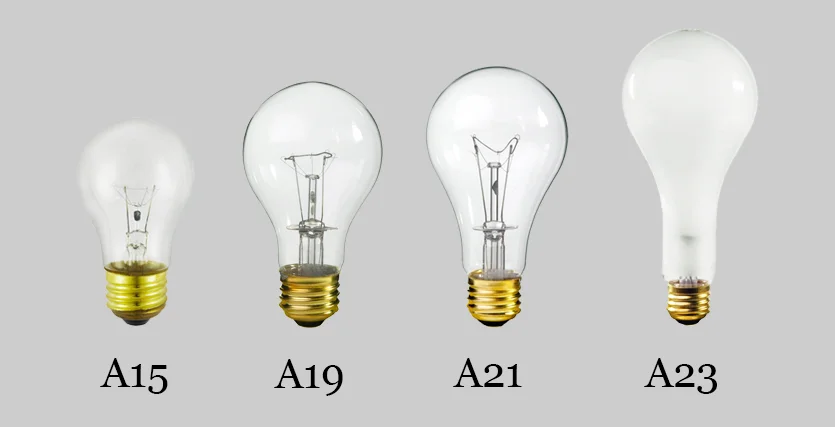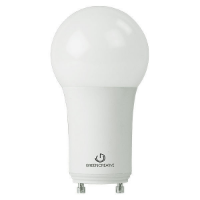Light Bulb Shape Guide: A-Shape
The present day light bulb has taken many shapes, forms, and bases, which can all be overwhelming when finding a replacement, but we at 1000Bulbs are here to help brighten your day. This article is the first installment in a comprehensive guide which will help you determine which style, size, and base of light bulb you need so you won’t be left in the dark.
A-Shape Light Bulb Shapes
The A-Shape light bulb is the most commonly used light bulb for general home lighting applications such as desk lamps, ceiling fans, and closets. This type of bulb was first made available in incandescent form by Thomas Edison but under the Energy Independence and Security Act of 2007, incandescent light bulbs are slowly being phased out of production with a few exceptions like antique light bulbs. Replacements of the same shape are offered in halogen and LED form.
The code of an A-Shaped light bulb is made up of two variables. The prefix “A” stems from the word “Arbitrary” and the second is the diameter of the largest part of the bulb measured in eighths of an inch.
If you know the diameter of the bulb, multiply it by 8 to calculate the numerical shape.
The following is a list of the common A-Shape light bulbs and their diameter in inches.
| Shape | Diameter in Inches |
|---|---|
| A15 | 1 7/8 |
| A17 | 2 1/8 |
| A19 | 2 3/8 |
| A21 | 2 5/8 |
| A23 | 2 7/8 |
Even though the a-shape light bulbs are similar, the difference lies in the dimensions. The A19 and A21 shaped light bulbs are most commonly mixed up due to their similar characteristics. Typically, both can be used for the same application but keep in mind the A21 is larger and may not fit into the table lamps, ceiling fans, etc. like the A19 would. One key characteristic between the two is that the A21 is naturally able to hold a higher wattage rating than the A19 due to its capability to more effectively dissipate heat.
This image is not to scale. But note the differences in the neck of the bulb, they grow longer as the bulb diameter increases.
A-Shape Light Bulb Base Types
LED a-shape bulb bulb with GU24 base
Similar to the shape, the base of the light bulb may also differ. The prefix “E” stems from the name “Edison” and the second is the diameter of the base measured in millimeters. No matter the style, the diameter of a light bulb is expressed in millimeters. For example a light bulb with an E26 or medium base would measure 26 millimeters (1.02 inches) at its widest point of the base. The following are a list of common base types which are featured on A-Shape light bulbs.
| Code | Base Type |
|---|---|
| E12 | Candelabra |
| E17 | Intermediate |
| E26 | Medium |
| GU24 | Twist and Lock |
Most A-Shape light bulbs feature a (E12, E17, or E26) screw-in-base. The exception is the GU24 base, featuring a two-prong base that requires a twist and lock type of installation.
Where are A-Shape Light Bulbs Used?
The A-shape light bulb has omni-directional light distribution making it one of the most versatile shapes, with special applications including silver bowl light bulbs, which help diffuse light to reduce glare and redirect the light towards the ceiling. For the summer nights, yellow bug lights don’t completely eliminate bugs, but help make your home less visible to flying insects. For a festive feeling, colored bulbs help set the tone for themed parties or your favorite sporting team. The standard shape bulb can be found in nearly one form or another for the following applications.
Table lamps
Ceiling fans
Hall lights
Wall sconces
Ceiling fixtures
Depending on what application your light bulb was originally designed for, it is best practice to verify the attributes of a light bulb before installing. Prior to committing to a light bulb, you may also want to consult the wattage requirements of the fixture to make sure you won’t end up having to look for your shoes in the dark. If you’re still asking yourself, “Which light bulb do I need?” our previous article of how to buy a light bulb offers a full walk through process to get you on your way.
Do you feel inspired to go to test out your new found knowledge on every light bulb you see? Feel free to leave us a comment, letting us know your results and the outcome of your research below. As always for more lighting knowledge and humor check back on our blog or keep in touch with us on our Facebook, Twitter, LinkedIn, or Pinterest.











